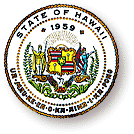Efforts in the works
to repeal gas-cap law
Gov. Linda Lingle says she would move to repeal the state's one-of-a-kind gasoline price cap law before it goes into effect in September.
Lingle previously said there were no bills planned for this session to repeal the price cap -- which she has opposed -- but corrected herself after consulting with Business and Economic Development Director Ted Liu.
 "I know we went back and forth on how we were going to approach this," she said yesterday in a news conference after her State of the State address.
"I know we went back and forth on how we were going to approach this," she said yesterday in a news conference after her State of the State address.
Liu stepped in to clarify: "We still take the firm position that the measure to try to reduce gasoline prices using a strict gasoline cap does not work."
The administration also is seeking $400,000 in the next fiscal year to fund three new jobs within the Department of Business, Economic Development and Tourism to help with oversight of the law that was passed in 2002 and revised last year.
House leaders said they would study the law again this year to see if any changes needed to be made.
The law requires the state to set a maximum price at which gasoline is sold based on a national average of prices. The Public Utilities Commission would implement the law with oversight by Liu's department.
Senate President Robert Bunda said he firmly believes the cap is needed to bring down fuel costs in Hawaii.
In the most recent Lundberg Survey of prices nationwide, Honolulu had the highest average price for all grades of gasoline combined at $2.32 a gallon. On Maui the average price for regular, self-serve unleaded gasoline was $2.68 a gallon in Wailuku, while on the Big Island, motorists were paying $2.46 a gallon in Hilo, according to AAA.
"That is too high," said Bunda (D, Kaena-Wahiawa-Pupukea). "I think the retailers or the wholesalers are inflating those numbers. They know that the cap is in place, so they're going to manipulate the numbers like mad, which they have."
Supporters of the price cap say there is no economic reason for Hawaii's gasoline prices to be typically higher than other states. Opponents -- mostly gas station owners and the oil industry -- say Hawaii's anti-business climate and high taxes drive up the costs.
If the gas cap is not repealed, Liu said his agency needs at least three more people who would help in market research and analysis of the state's fuel industry.
The agency contends that gathering as much information as possible and making it public will help determine whether oil companies are gouging consumers, but also encourage competition.
If the information reveals that there are huge profits to be made, that will encourage more oil companies to do business in Hawaii and spur competition, Liu said.
www.hawaii.gov/gov/
[News] [Business] [Features] [Sports] [Editorial] [Do It Electric!]
[Classified Ads] [Search] [Subscribe] [Info] [Letter to Editor]
[Feedback]
